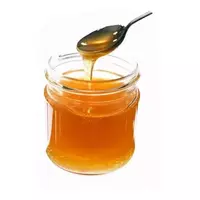Treacle

Molasses (maltodextrin, dextrinmaltose) is a product of enzymatic or incomplete acid hydrolysis of starch (mainly corn or potato). In everyday life, molasses are often called various sugar-containing syrups. It's so difficult, isn't it. Among the people, by the way, it is called artificial honey, because they have many similarities in appearance and taste. This can be said as a semi-finished product obtained during the production of sugar and starch. Ultimately, a semi-liquid mass is obtained, similar in consistency to young honey, but much sweeter than sugar. Molasses are used in canning and confectionery, and also in the production of upprettes. The calorie content of molasses is 316 kcal per 100 grams of viscous mass.
In cooking, molasses are used in the manufacture of some varieties of bread and gingerbread. When added in small quantities, this wonderful additive determines the color, and in significant quantities, the viscosity and taste of dough products. The useful properties of molasses are used in the manufacture of frozen ice cream and desserts, as it is able to lower the freezing point of the product.
Due to the fact that molasses have hygroscopic and anti-crystallization properties, it is widely used for the manufacture of many types of sweets, halva, caramel, jam, gingerbread, liqueurs, as well as some types of bakery products.
However, despite the fact that it is a very sweet product, the benefits of molasses are simply indispensable in the production of various beers, as it ensures deep fermentation of the product, increasing its taste stability and extending the shelf life of the drink. The food industry already does not imagine the production process without the use of this additive. Areas where molasses are an important ingredient are difficult to cover completely. These are the production of ketchups and soft drinks (a sugar substitute), preservation of fruits and berry crops and many others.
Benefits of molasses
From a medical point of view, the benefits of molasses are expressed in the content of some important macronutrients, such as phosphorus, potassium, calcium, sodium and magnesium, as well as iron. All these substances are simply necessary to replenish the body with energy reserves.
Harms of molasses
The harm of molasses is practically unknown to consumers, except when individual intolerance to the original product (that is, what it is made of) is found. People with elevated blood sugar should not be abused this product, since molasses are practically the same sweet substance.
By the way, if you are allergic to natural honey, to which you are not indifferent, we advise you to replace it with molasses: the taste and appearance are almost identical, however, the aroma is not the same.
molasses 316 kCal
Energy value of molasses (Ratio of proteins, fats, carbohydrates - ju):
Proteins: 0 g (~ 0 kCal)
Fats: 0.3 g (~ 3 kCal)
Carbohydrates: 78.3 g (~ 313 kCal)
Energy ratio (b | y): 0% | 1% | 99%
 Español
Español Français
Français Português
Português Русский
Русский 简体中文
简体中文 繁體中文
繁體中文 日本語
日本語 한국어
한국어 العربية
العربية Türkçe
Türkçe Қазақ
Қазақ Deutsch
Deutsch Italiano
Italiano Українська
Українська
